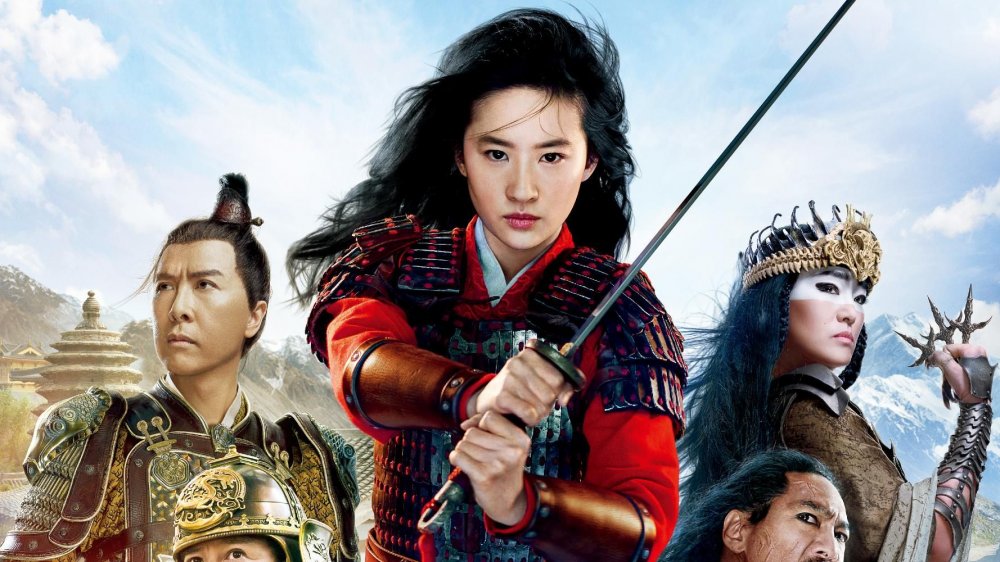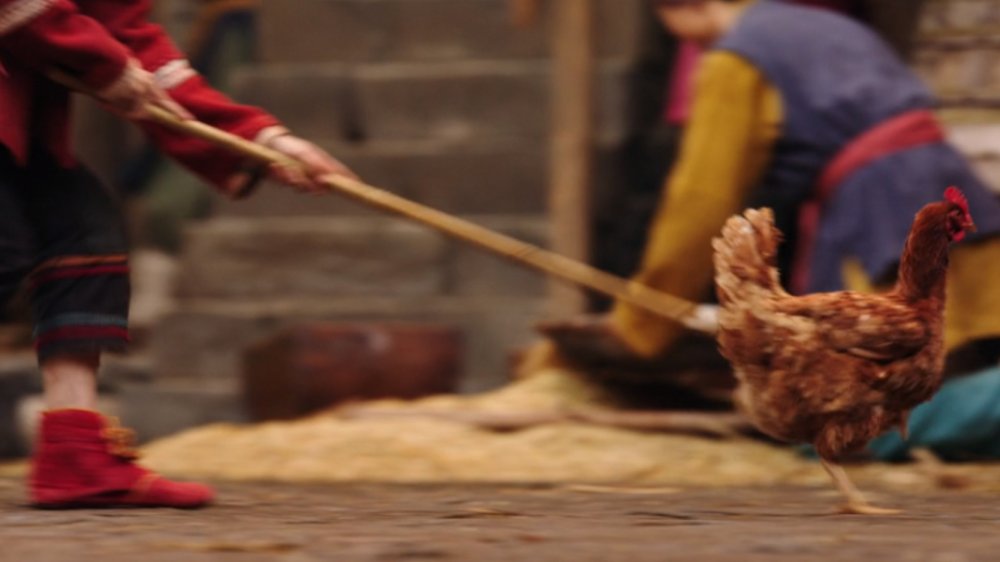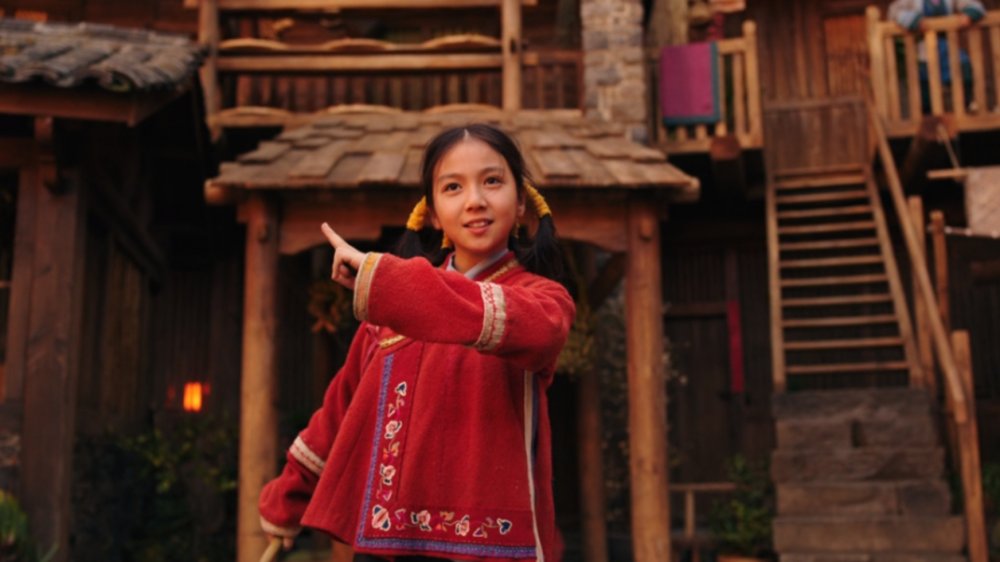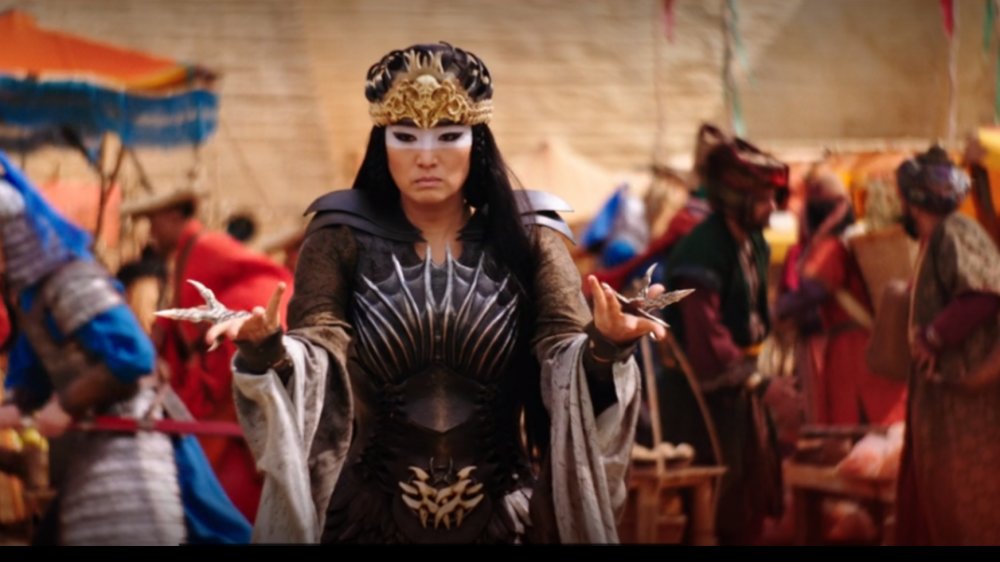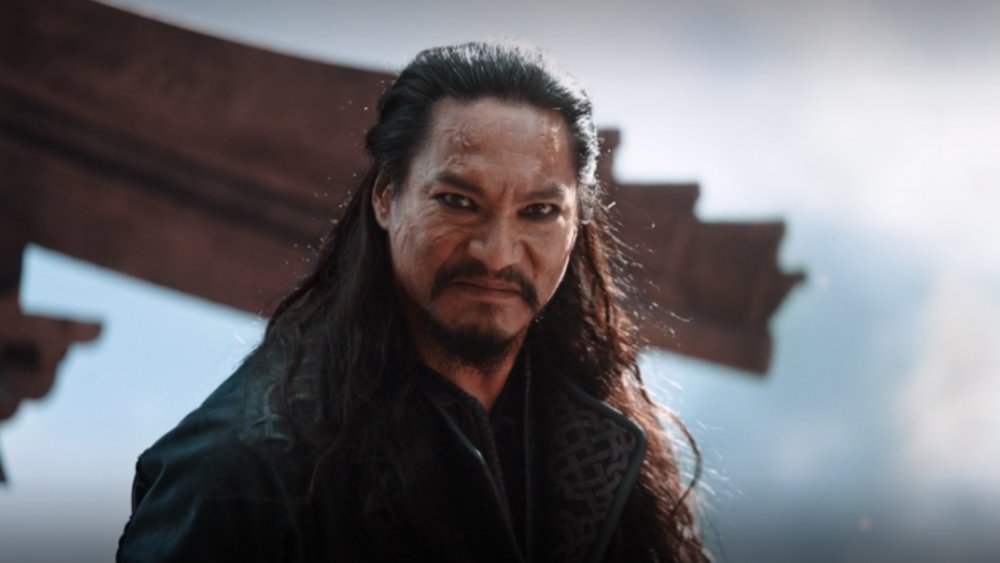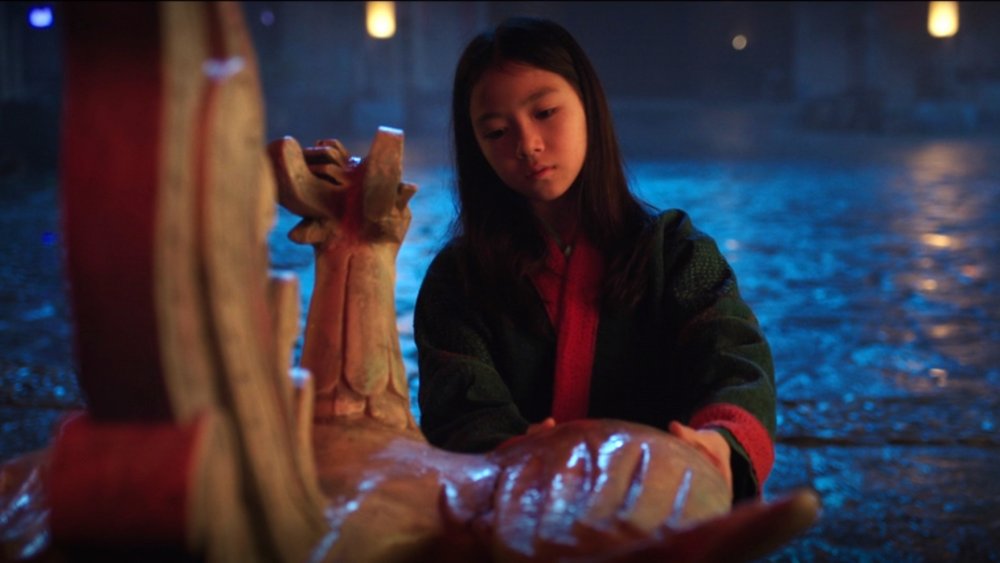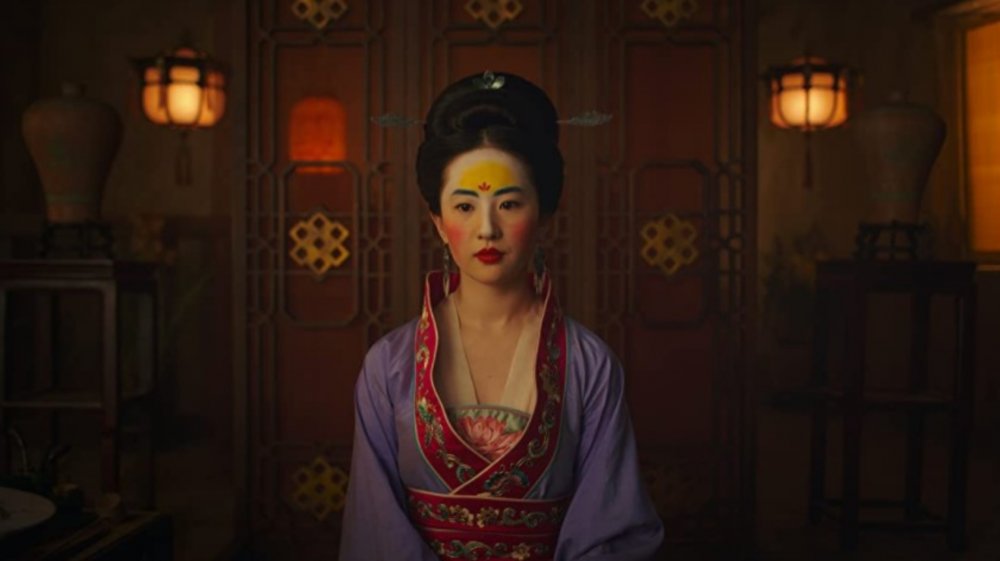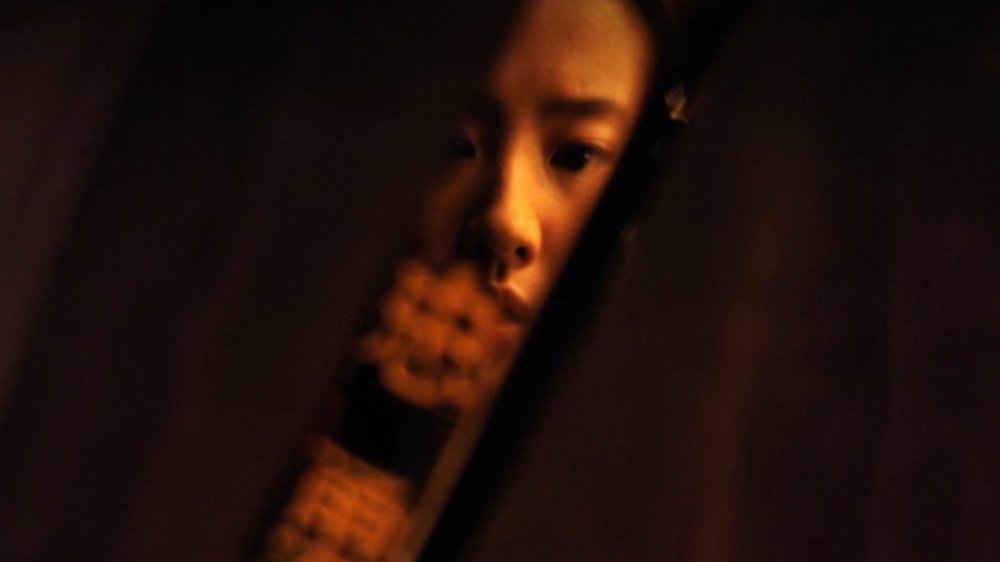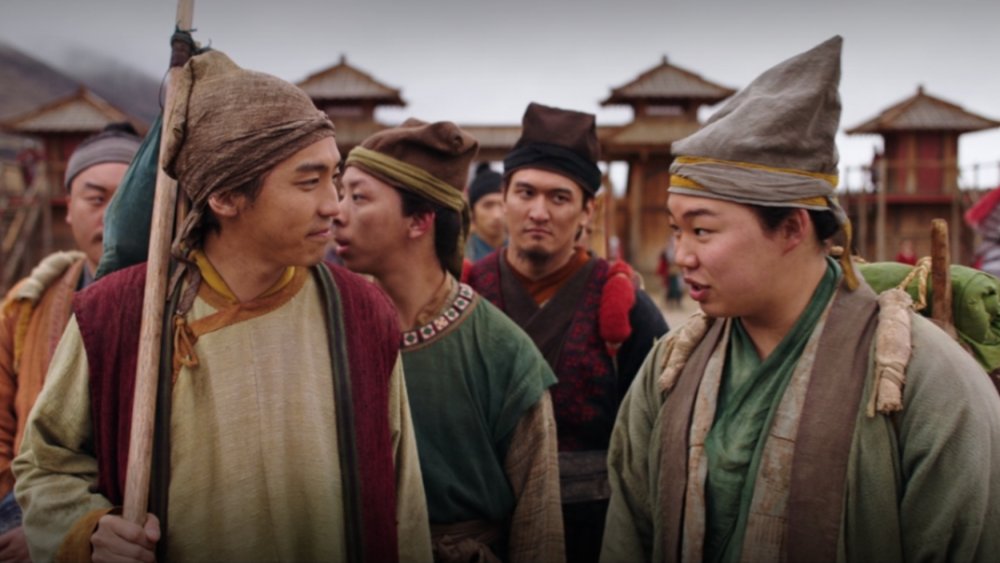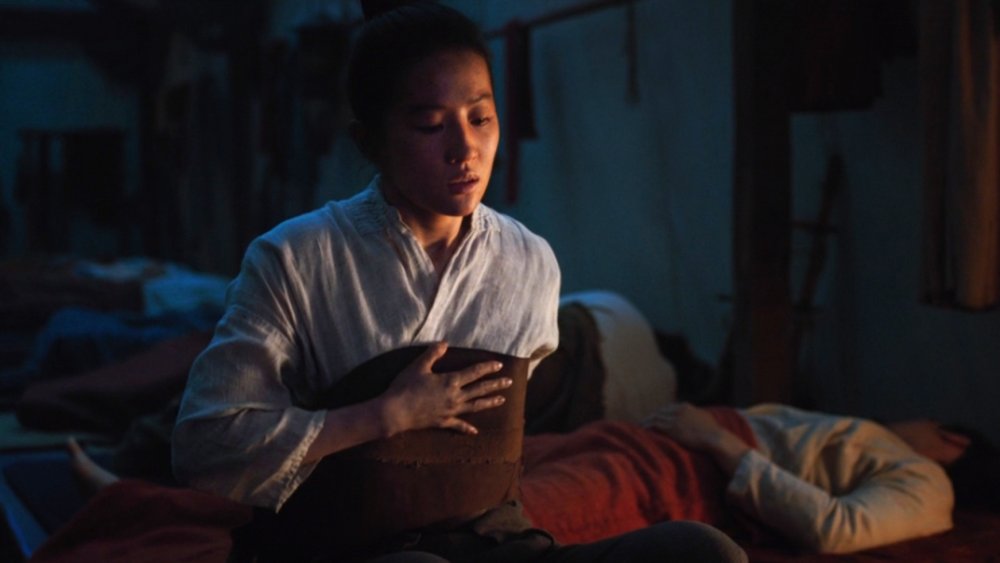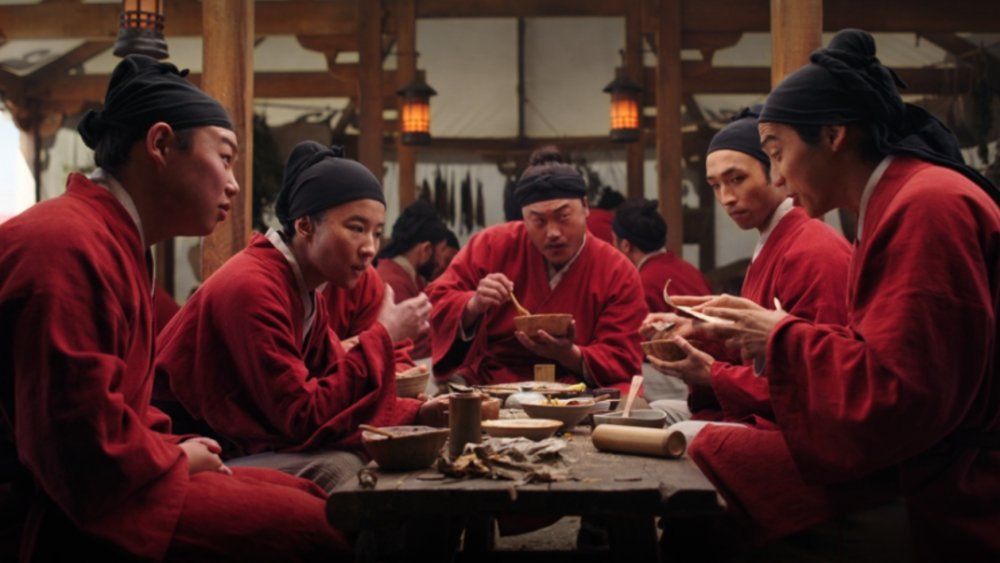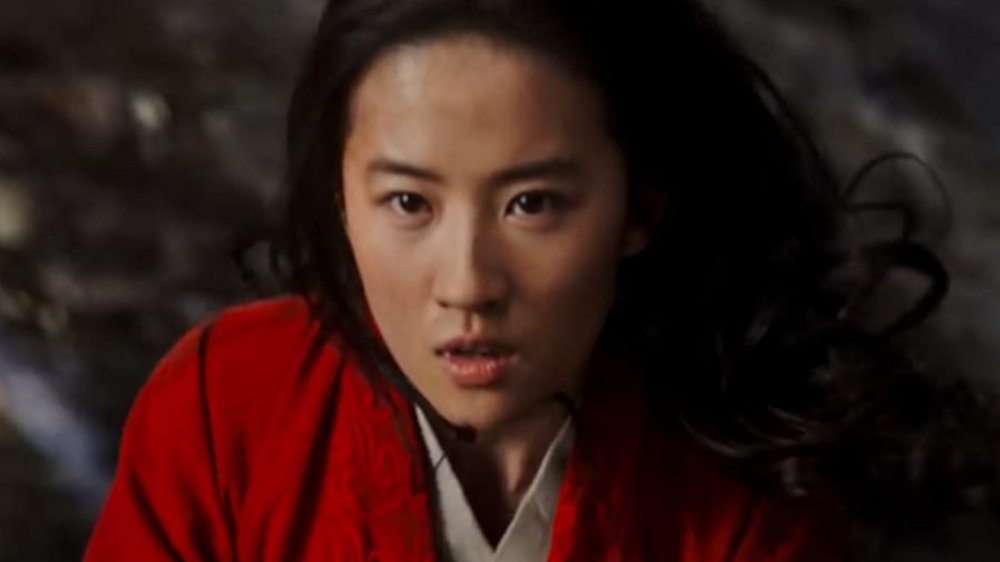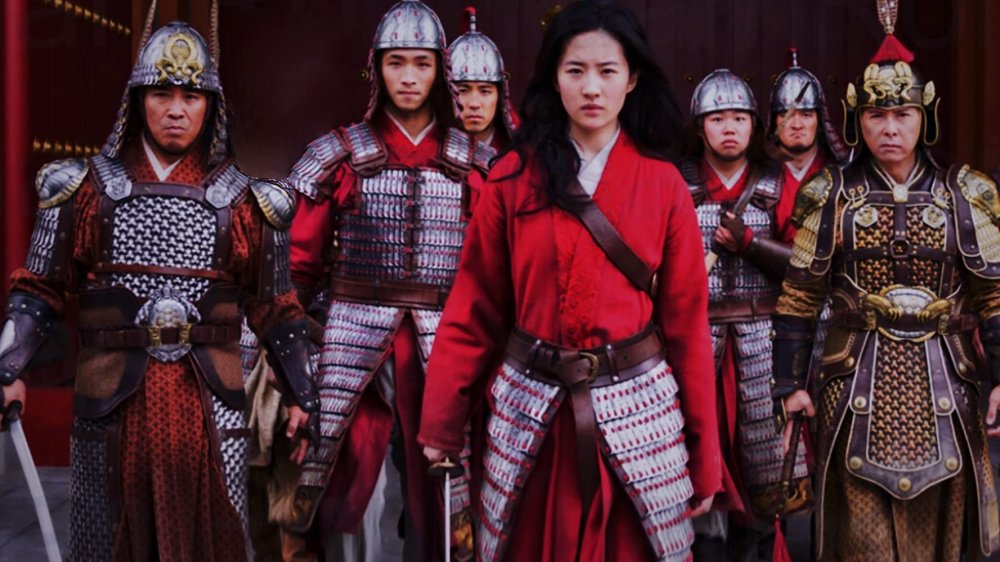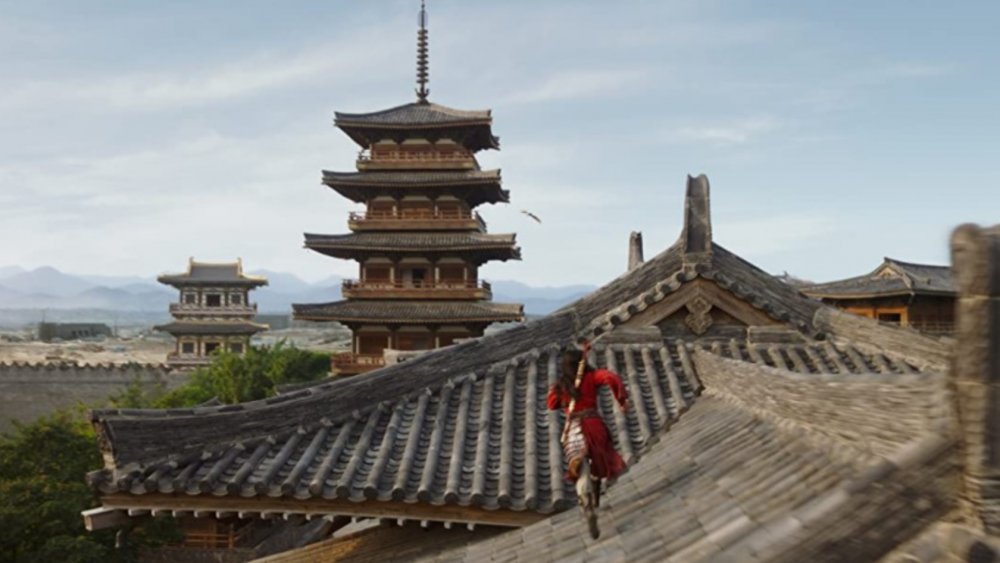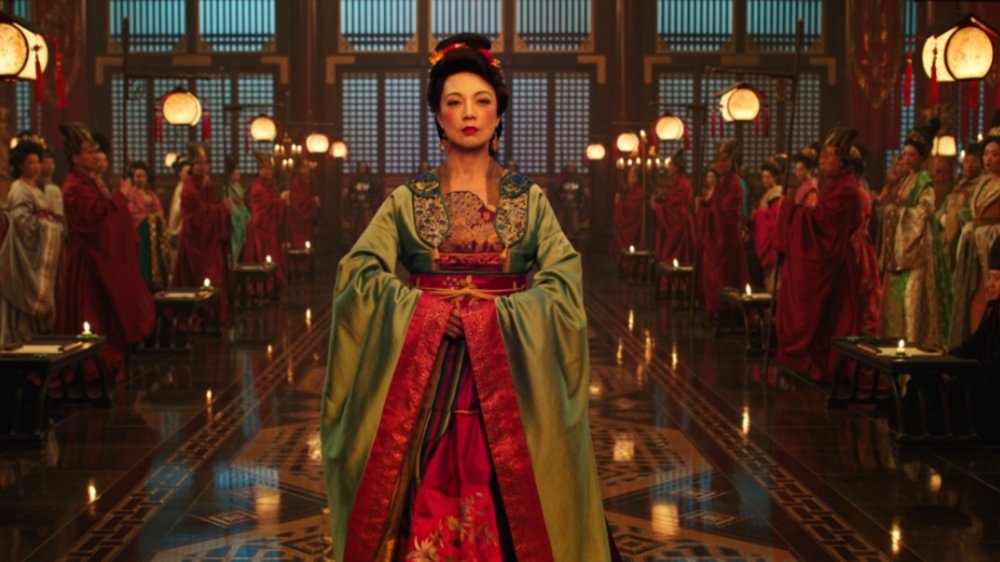Easter Eggs You Missed In The Live-Action Mulan
Disney's live-action Mulan reimagines its beloved 1998 animated film that introduced the Chinese warrior woman of legend to a new audience. The film hit Disney+ instead of theaters because of the COVID-19 pandemic, which reduces its stunning vistas, costume design, and intricate martial arts to a smaller scale. But that also gives home viewers — especially those who loved the earlier version — a chance to spot several homages to the original. The new Mulan tosses out a lot of the animated film's features, with mixed results. Goodbye to talking dragon guardians, chirping lucky crickets, and an endearingly down-to-earth heroine. Enter supernatural powers and a host of new characters — and did we mention the "gravity-defying, wuxia-inspired" combat and stunts?
This Mulan does have its charms, though, including an impressive cast of veterans such as Jet Li, Donnie Yen, Jason Scott Lee, Li Gong, and Rosalind Chao, as well as warm chemistry between Mulan (Yifei Liu, The Assassins) and her fellow soldiers, especially the handsome Honghui (Yoson An of TV's The Luminaries). Yifei Liu impressively did most of her own stunt work. Plus, the film includes a sublime cameo by Ming-Na Wen, the original Mulan herself! Grab your sword and your armor as we check out the Easter eggs you missed in the live-action Mulan. Spoilers ahead!
Antics for the birds
Early in the animated version, a teenage Mulan (voiced by Ming-Na Wen) prepares to meet the local matchmaker — but first, she has to complete her chores. She sends her dog out into the yard dragging a bag of feed for the family's chickens, which winds up leaving a trail encircling her father. As he prays to the family's ancestors, Dad sighs and says an extra prayer for his impish and eccentric daughter as the birds peck and cluck around him.
The live-action Mulan also introduces Mulan through some antics for the birds as a younger Mulan (Crystal Rao) helps her dad corral their chickens. One scurries free, sending her chasing it mischievously around their village before spooking it off the rooftops. Her dad (Tzi Ma) struggles not to smile over how impressed he is with her athleticism while the villagers scowl because, just like in the animated film, girls aren't supposed to do that sort of thing.
Bold red and then blues
Mulan's clothes in the live-action film echo the clothing she wears in the animated version in a couple of ways. In the animated film, before she joins the army, Mulan tends to wear a lot of blue and red, such as a dress with a blue bodice and a red sash. Likewise, in the live-action film, blue and red are the colors in her wardrobe before she dons her armor.
However, as a child, Mulan also sports a bright-red top with gold trim and gold ribbons in her hair. The colors and her prankish personality at this point bring to mind Mushu, the tiny dragon sidekick voiced by Eddie Murphy in the animated film. Mushu doesn't appear in this version — this time, a silent phoenix is Mulan's family guardian and protector — but it's hard not to think that the spunky dragon inspired the look of Mulan as a young spitfire.
A watchful eye
In the animated Mulan, a falcon is a spy and scout for the villain, Shan-Yu, who leads the Hun army to attack the Emperor. The bird is a prominent accomplice, even perching on Shan-Yu's shoulder. The live-action version gives villain Böri Khan (Jason Scott Lee) a similar aerial accomplice in a hawk, which provides reconnaissance and perches nearby as he organizes his troops.
The animated bird didn't speak to Shan-Yu, but the live-action version communicates well — after transforming back into her human form. Veteran Chinese actor Li Gong plays this sorceress, named Xianniang, who like this version of Mulan is strong with the power of chi, described in the film as "boundless energy for life itself." The makeup, props, and costume design keep the bird motif throughout Xianniang's look, from her talon-like throwing stars to her headdress and flowing sleeves that almost look like wings.
A villain's magnetic eyes
One striking feature of Shan-Yu, the villain in the animated Mulan, were his eyes with yellow irises and black sclera (the anatomical term for what is typically the white part of the eye). In the live-action film, Jason Scott Lee of TV's Hawaii Five-0 plays a new villain, Böri Khan, the leader of the invading army (the Rouran instead of the Huns). Aside from being in league with a sorceress, Khan has several tricks up his sleeves, including running up walls wuxia style and catching arrows in midair.
Khan is a formidable opponent, and Lee — who has partnered with Disney before, playing Mowgli in 1994's live-action The Jungle Book and voicing a character in Lilo & Stitch – seems to relish playing a bad guy, and his evident enjoyment is infectious. Yet even though his character is new, the film draws a parallel between Khan and Shan-Yu through shots of Lee's eyes. They're lit in such a way that they look more golden than brown.
A broken wing but yet can fly
In the animated film, Mulan's family guardian is a great stone dragon, which the ancestors urge Mushu to awaken to protect the young woman once she leaves for the battlefield disguised as a man. While trying to rouse the beast to transform from a statue, Mushu inadvertently breaks off the statue's ear, then shatters it. Out of guilt and self-preservation, the little dragon sets off to assist Mulan instead.
In the live-action film, Mulan's family emissary is the phoenix. Early on, while chasing a chicken around her village courtyard as a child, the spirited Mulan steps on her family's phoenix statue and snaps off its wing. Her father finds her outside after dark, trying to fix it.
"Some say the phoenix is consumed by flame," her dad says. "But it emerges again. I think she can survive a broken wing." Considering how Mulan sees the colorful bird as a guide at several key points later in the movie, the phoenix clearly doesn't hold a grudge.
A lotus blooms
The name Mulan means "wood orchid," and this film — like the animated version — uses floral imagery to refer to the main character. Notably, in both versions, when Mulan goes to meet the local matchmaker, she has a comb with a jeweled flower in her hair. Then when Mulan decides to join the army in her father's place, she leaves the comb on her parents' nightstand in both films to say goodbye.
The live-action film has additional references, however. First, as Mulan's mother (Rosalind Chao) and sister (Xana Tang) help her dress for the meeting with the matchmaker, the soundtrack plays the melody of the animated film's song "Honor to Us All," whose lyrics refer to Mulan as being "like a lotus blossom, soft and pale." Mulan's makeup is more elaborate here than in the animated version, with a lotus blossom adorning her forehead.
Later, as Mulan secretly bathes away from the troop garrison, the camera focuses on the blossoms of a nearby tree. While this gives Mulan some privacy, it also calls back to a moment in the animated film when Mulan's father points out a tree blossom that hasn't opened. "I'll bet that when it blooms," he says, "it will be the most beautiful of all."
Seeing her reflection
The theme of the animated Mulan, depicted through the standout soundtrack song "Reflection," is being true to yourself. As the lyrics say, "When will my reflection show who I am inside?" As she sings, Mulan wanders into the temple where her family prays to her ancestors, seeing her reflection in the memorial stones there. She later looks at her reflection in her father's sword, then uses the sword to slice off her long hair before she joins the army.
The live-action Mulan doesn't cut off her hair before wearing her disguise, but she does look at her reflection in the sword at a few key moments. Etched on the sword are figures for Loyal, Brave, and True, three virtues representing her family's honor — and qualities Mulan aspires to exemplify. Whenever she looks at her reflection in the sword, the audience knows she's wondering if she's reflecting these virtues.
A guy named Cricket
In addition to Mushu, the animated Mulan has another tiny sidekick, a lucky (and adorable) cricket named Cri-Kee. Mulan's grandmother gives her the insect before Mulan meets the matchmaker in the hopes that all will go well. Viewers who remember how the cricket gets loose might doubt Cri-Kee's luck factor, but the little guy, who speaks only in chirps, redeems himself through several narrow scrapes later in the film.
The live-action Mulan doesn't have a cricket in her pocket, but she does have a soldier colleague named Cricket (Jun Yu) who becomes one of her loyal friends. Audiences first meet Cricket as he talks to Honghui in the line of soldier hopefuls reporting for duty. "My mother says I was born under an auspicious moon. That is why my mother says I'm a good luck charm," he says, explaining his unusual name. While this Cricket doesn't play the drums or fall into a teacup like his animated counterpart, he's certainly a likable pal.
Hiding who she is
To hide the fact that she's a woman, Mulan binds her chest, wrapping fabric around her torso much like her mother and sister earlier in the film wrap a colorful sash around her waist. She's careful about not being seen, waiting until everyone in the barracks is asleep to remove this part of her disguise so she can sleep, then dressing early. But her love interest, Honghui — here, a fellow soldier and trainee instead of a mentor and captain like the animated film's Li Shang — glimpses her getting dressed one morning, implying that he suspects Mulan's secret.
In the animated film, Mulan's future sweetheart Li Shang also learns her secret ahead of the other troops in her battalion. That happens after Li Shang takes Mulan to a tent for medical treatment after she's wounded before saving him during an avalanche. The doctor whispers to Li Shang, who enters the tent to find Mulan with white fabric wrapped across her chest.
A girl worth fighting for
In the animated Mulan, the soldiers bond as they march while singing about "A Girl Worth Fighting For," listing the qualities they'd love to find in a woman once the war is over. On the list are pale skin, "eyes that shine like stars," and being a great cook. In the live-action version, the soldiers discuss their ideal woman after one fellow shares a sketch of the beauty to whom he's engaged. Yao (Chen Tang) says he wants a woman with big, wide hips. Cricket rhymes that he likes "cherry red lips." Another doesn't care what she looks like; just what she cooks like. In both films, the disguised Mulan says her ideal woman is smart, although live-action Mulan also adds being courageous and having a sense of humor.
"She's not describing a woman; she's describing me!" says Yao. Honghui disagrees, to everyone's laughter.
Incidentally, the film weaves references to another song from the animated version, the humorous "I'll Make a Man Out of You," through the dialogue of battalion Commander Tung (Donnie Yen) while the soldiers train.
Who she is inside
It seems fitting that when the live-action Mulan chooses to embrace her fighting abilities and not hide that she's a woman any longer, the soundtrack plays the melody of "Reflection" from the animated version. Originally, that soul-searching song — a breakout hit for then-newcomer Christina Aguilera — expressed Mulan's unease and ambivalence with a façade that her village and family liked but wasn't true to herself. But in the live-action version, the music shows Mulan's confidence.
At a pivotal moment, Mulan faces off against the sorceress, who sees through her disguise and warns the young woman, "Your deceit weakens you." Then she strikes Mulan down. Mulan doesn't die, however. Once she's left alone, like her family's phoenix, she rises. Riding her horse in a triumphant return to the battlefield to help her colleagues, she takes down her hair and sheds part of her armor — along with her secret identity.
Context isn't the only difference between the way this song is used in the two films: After the live-action Mulan concludes, star Yifei Liu sings a version of "Reflection" in Mandarin as the credits roll.
Standing in solidarity
Once Mulan reveals her true self in both films, she puts her life in danger because of societal rules that forbade women from being in the military. In the animated film, Li Shang could have killed her — the penalty was that severe — but because she saved his life, he spares her and exiles her from the battalion instead. In the live-action film, Commander Tung is ready to execute Mulan for her deception. "Kill me if you must, but first listen," she says, warning him and the other soldiers that Böri Khan is on his way to ambush the Emperor (Jet Li).
Tung at first says that only a fool would listen to "someone whose very existence is a lie." But Honghui comes to Mulan's defense, saying that the commander would have believed her as a man — so why not now?
"I believe Hua Mulan," says Cricket, saying Mulan's full name.
"I believe Hua Mulan," each of the other soldiers who respects her agrees.
It's a moment of solidarity that reminds film buffs of the famous scene in 1960's Spartacus when a group of former slaves shields their leader (Kirk Douglas) from death by identifying themselves as him.
Fighting on high
During the climax of the animated version, Mulan saves the Emperor by helping her colleagues spirit him to safety. She then faces off against Shan-Yu on a rooftop. As he lunges at her with his sword, she disarms him, catching the blade in a hand fan and then pointing it back at him — a bit of visual irony about outwitting him with her feminine wiles.
The live-action Mulan also battles the villain during the climax of the movie, but first races across rooftops to get there. She follows the sorceress in her hawk form, tailing the bird to where Böri Khan holds the Emperor captive. Although much of their fight occurs on scaffolding for a new temple, Böri Khan and Mulan at one point oppose each other on a narrow beam, much like the beam across the rooftop where the two balance during their clash in the animated film. While we won't spoil quite how she does it in the live-action version, Mulan also gets the upper hand — and Böri Khan's sword.
Your Highness, meet Mulan
Just like in the animated Mulan, fireworks at the Imperial City celebrate the invaders' defeat. As the melody from "Reflection" plays once more, guests at the palace watch an elegant woman in green silk walk down the aisle toward the Emperor's throne. Then the audience sees the visitor from the Emperor's point of view, revealing a splendid cameo: Ming-Na Wen, the voice of the animated Mulan, who bows to show this film's portrayer behind her.
Wen may be better known for her live-action work, such as playing Melinda May on TV's Agents of S.H.I.E.L.D. But she holds Mulan — Disney's only East Asian heroine — close to her heart. She also voiced Mulan in 2018's Ralph Breaks the Internet, as Disney's princesses and heroines hung around in comfy clothes. Having her introduce Yifei Liu is a graceful way to pass the torch to the live-action star.
"Your Imperial Highness, Hua Mulan," Wen says, before stepping off to the side.
